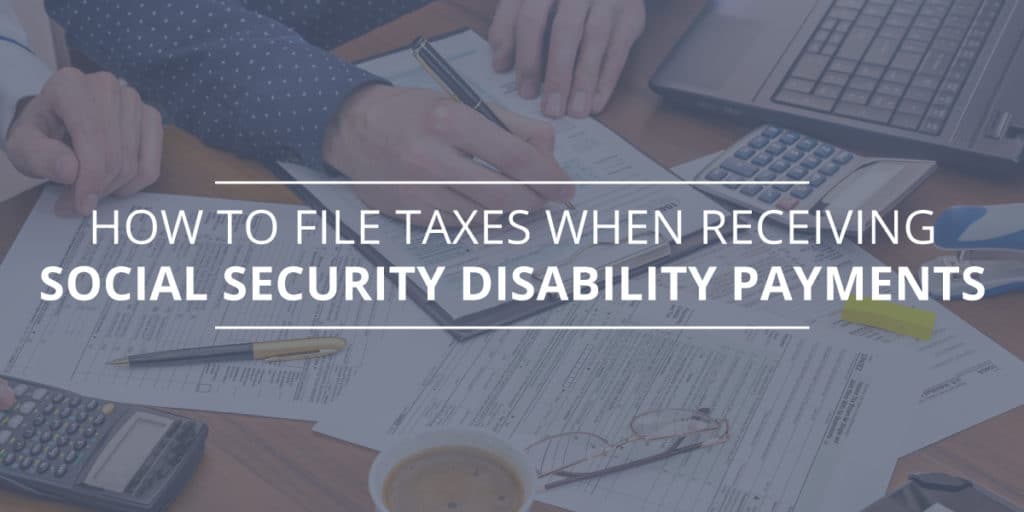
It may be a cliché, but there is some truth in it: the only things that are certain in life are death and taxes. But what happens when you are approved for Social Security disability benefits? Are you required to file taxes?
Do I Have to File Taxes for My Disability Benefits?
The Internal Revenue Service (IRS) does require individuals receiving disability benefits to file taxes annually. However, depending on your income, you may not be required to pay taxes on the benefits that you receive. Even if these payments are taxable, you will still only be taxed on a percentage of the total income received.
Like all issues related to Social Security and the IRS, the taxation of disability benefits can be a complicated subject. A seasoned Philadelphia disability benefits lawyer can increase your chances of obtaining these benefits — and help you understand your tax obligations once the payments start.
Are Social Security Disability Payments Taxable Income?
The question of whether Social Security disability payments are taxable depends on your income. If you make under a certain amount, then your disability benefits are not taxable, and you will not have to pay taxes on them. However, if you make over that amount — either individually or as a household — then you will be required to pay taxes on some of your disability benefits.
Under IRS regulations, if you make $25,000 or less as an individual, or $32,000 or less filing jointly, you do not have to pay taxes on your disability benefits. If your income exceeds these limits, then you will have to pay taxes on a portion of your disability payments. How much you will have to pay in taxes depends on your income level.
The IRS uses a formula to assign a percentage of benefits that are taxable based on income. The current formula is as follows:
- If you earn more than $25,000, but less than $34,000 as an individual, 50% of your disability benefits income will be taxable.
- If you earn more than $32,000 but less than $44,000 while filing jointly, 50% of your disability benefits income will be taxable.
- If you earn more than $34,000 filing as an individual or more than $44,000 filing jointly, then you be required to pay taxes on 85% of your disability benefits income.
A tax professional can work with you to help you determine the exact amount that you will be required to pay. This will be based on factors such as the deductions that you take and the other types and amount of income that you have received during the year.
How Do I Claim Back Payments?
If your Social Security disability benefits application is approved, the Social Security Administration (SSA) will issue you a back payment for the time that you spent waiting for approval. Back payments are usually paid as a lump-sum amount, which can complicate your taxes.
If you claim the full amount of your back payment in one tax year, then it will increase your income significantly, putting you in a higher tax bracket. Because these lump sum payments often cover more than one calendar year, you can claim it over several years by amending prior years’ returns. The IRS offers a worksheet to determine if spreading out a lump sum payment over several years will lower your taxes.
Does the SSA Withhold Taxes?
As a general rule, the SSA does not withhold taxes on disability benefit payments. Each year, the SSA will mail you a form SSA-1099. This form will contain the information necessary to file your taxes, including how much money you received in disability benefits.
If you owe taxes at the end of the year, then you can request that the SSA withhold taxes from your disability payments. The best way to do this is to contact the SSA directly to ask them to withhold taxes.
Work with a Philadelphia Disability Benefits Lawyer
The road to disability benefits can be long and arduous. A skilled Philadelphia disability benefits lawyer can shepherd you through the process, helping to gather documentation, put together a strong case, and ease your anxiety about the challenges. Your lawyer can also provide you with information about how your disability benefits will impact your tax situation.
Bross & Frankel is devoted to working with clients throughout the Philadelphia metro area who suffer from disabilities that prevent them from working. With more than 50 years of combined experience in disability law, we understand how the system works — and we put that knowledge to work for our clients. Contact us today at (856) 795-8880, or online to schedule a free claim review with one of our seasoned attorneys.

Rich Frankel is the managing partner of Bross & Frankel. He is a member of the New Jersey and Pennsylvania bars. He has focused exclusively on disability and social security benefits since 2005.
Mr. Frankel joined what is now Bross & Frankel after having watched his father struggle with disability, fighting a lengthy illness. Mr. Frankel founded the firm’s veteran’s law practice and substantially grew the social security disability practice, focusing Bross & Frankel’s ability to fight for all of the disability benefits available to his clients.
Mr. Frankel additionally fights for clients in court, obtaining frequent victories in Social Security appeals and against insurance companies in Federal court.